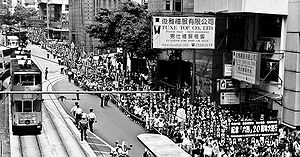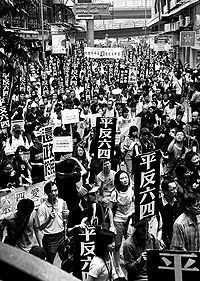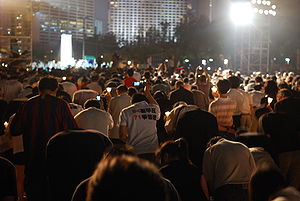
20th anniversary Tiananmen square incident march
Encyclopedia

Tiananmen Square protests of 1989
The Tiananmen Square protests of 1989, also known as the June Fourth Incident in Chinese , were a series of demonstrations in and near Tiananmen Square in Beijing in the People's Republic of China beginning on 15 April 1989...
, during which the Chinese government sent troops to suppress pro-democracy movement. The anniversary is remembered around the world; on Chinese soil, any mention of the event is completely taboo in Mainland China. Events which mark it only take place in Hong Kong, and in Macao to a much lesser extent.
Background
In the Tiananmen Square protests of 1989Tiananmen Square protests of 1989
The Tiananmen Square protests of 1989, also known as the June Fourth Incident in Chinese , were a series of demonstrations in and near Tiananmen Square in Beijing in the People's Republic of China beginning on 15 April 1989...
, thousands of students and protests had gathered in Tiananmen square
Tiananmen Square
Tiananmen Square is a large city square in the center of Beijing, China, named after the Tiananmen Gate located to its North, separating it from the Forbidden City. Tiananmen Square is the third largest city square in the world...
, when troops opened fire. An unknown number of people were wounded or died in the incident. As the People's Republic of China has publicly embraced the one country, two systems
One country, two systems
"One country, two systems" is an idea originally proposed by Deng Xiaoping, then Paramount Leader of the People's Republic of China , for the reunification of China during the early 1980s...
model of governance for Hong Kong, the annual 4 June observance which has become a tradition since 1989 has continued after the transfer of sovereignty from Britain to China. It is the only place on Chinese soil where the event is openly commemorated in any way and on any scale.
The 20th anniversary was commemorated in the backdrop of the release of Zhao Ziyang's memoirs to the public on 14 May 2009, entitled Prisoner of the State: The Secret Journal of Premier Zhao Ziyang
Prisoner of the State: The Secret Journal of Premier Zhao Ziyang
Prisoner of the State: The Secret Journal of Premier Zhao Ziyang is a 360-page book in English published in May 2009 containing the memoirs of People's Republic of China's former communist leader who was sacked after the Tiananmen Square protests in 1989. It is based on a series of about 30 audio...
. That same day, Chief Executive of Hong Kong, Donald Tsang
Donald Tsang
Sir Donald Tsang Yam-kuen, GBM, KBE is the current Chief Executive and President of the Executive Council of the Government of Hong Kong....
spoke in the Legislative Council on a motion demanding vindication of the Tiananmen pro-democracy movement, Tsang said he believed 'Hong Kong people will make an objective assessment of the nation's development', after noting China's economic development. His claim that he was echoing the sentiments of Hong Kong people provoked a furore, for which he quickly apologised.
One day before the protest march, news broke that there had been an alleged attempt on the lives of two leading political figures - leading Hong Kong democrat Martin Lee
Martin Lee
Martin Lee , QC, SC, JP, was the founding chairman of the Democratic Party in Hong Kong. He was a directly-elected Member of the Legislative Council of Hong Kong for the Hong Kong Island geographical constituency...
and media mogul Jimmy Lai. Lee publicly disclosed that an alleged assassin from the People's Republic of China and a HK accomplice had targeted him in 2008 after seizing a hand gun and ammunition. Jimmy Lai, a long-time critic of Beijing and the owner of Apple Daily
Apple Daily
Apple Daily is a Hong-Kong-based tabloid-style newspaper founded in 1995 by Jimmy Lai Chee Ying and is published by its company, Next Media. A sister publication carrying the same name is published in Taiwan, Republic of China under a joint venture between Next Media and other Taiwanese companies...
, revealed he was also the target of the assassination attempt. The plot was foiled when police arrested 50-year-old would-be assassin Huang Nan-hua on 14 August 2008. Lee himself said, had the attempt succeeded, it would have been the worst possible nightmare for the Communist Party of China
Communist Party of China
The Communist Party of China , also known as the Chinese Communist Party , is the founding and ruling political party of the People's Republic of China...
, which wouldn't have known how to handle the situation.

Denied entry to Hong Kong
The BBC's correspondent reported that the local authorities did stop some of the Tiananmen exiles coming into Hong Kong to please Beijing. The media reported that three former Tiananmen student protesters have been denied visas to attend a panel discussion marking the anniversary at City University of Hong Kong, taking place from 2–3 June – Wang DanWang Dan
Wang Dan , a leader of the Chinese democracy movement, was one of the most visible of the student leaders in the Tiananmen Square protests of 1989. Wang holds a Ph.D. in history from Harvard University. From August 2009 to February 2010, Wang taught cross-strait history at Taiwan's National...
and Wang Juntao were denied visas when they applied at Chinese consulates; Yang Jianli
Yang Jianli
Yang Jianli is a Chinese dissident with United States residency.Yang, a Tiananmen Square activist in 1989, came to the United States, earned two Ph.D.s , and then founded the Foundation for China in the 21st Century...
was denied entry at Hong Kong airport three weeks previously. Jens Galschiøt
Jens Galschiøt
Jens Galschiøt, , is a Danish sculptor best known for the Pillar of Shame. Galschiøt moved to Odense in 1973, and in 1985 he opened a 2000 square metre combined foundry, studio, gallery and sculpture park...
, who sculptured the Pillar of Shame
Pillar of Shame
Pillar of Shame is a series of sculptures by Danish artist Jens Galschiøt. Each sculpture is an 8-metre tall bronze, copper or concrete statue — four have been erected, in Rome, Hong Kong, Mexico, and Brazil. A fifth one in Berlin was planned.-Symbolism:...
now located on the campus of Hong Kong University, was not allowed into Hong Kong. Xiang Xiaoji, a former student leader of the '89 protests, was also refused entry. The Hong Kong Immigration Department denied keeping a blacklist, but admitted to a 'surveillance list'. Wuerkaixi, a student activist, was also barred from entering Macau
Macau
Macau , also spelled Macao , is, along with Hong Kong, one of the two special administrative regions of the People's Republic of China...
. Pro-democracy legislator Lee Cheuk-yan said it was crucial that the city continued to mark the events of 20 years ago as it was the only place on Chinese soil that can commemorate the event.
Mainland China
The 1989 protest is still considered a counter-revolutionary riot by the Communist Party of ChinaCommunist Party of China
The Communist Party of China , also known as the Chinese Communist Party , is the founding and ruling political party of the People's Republic of China...
, and remains taboo. Dissidents are routinely picked up by police, warned, sent away, or put under house arrest at this sensitive time every year, and Beijing was reported to be under lockdown in the run-up to the anniversary.
The New York Times reported that the Communist Party established a top-level committee charged with ensuring social stability during the period of sensitive anniversaries. The committee is rumoured to be led by Xi Jinping
Xi Jinping
Xi Jinping is a high ranking politician of the People's Republic of China. He currently serves as the top-ranking member of the Secretariat of the Communist Party of China, the country's Vice President, Vice-Chairman of the Central Military Commission, President of the Central Party School and the...
and nicknamed "6521 Project
6521 Project
The 6521 Project, sometimes called the "6521 Group," was the moniker given to a nationwide operation initiated by the Communist Party of China in 2009 to ensure “social stability” by cracking down on potential dissidents during anniversaries of political significance...
" — supposedly in reference to the 60th anniversary of the founding of the PRC, the 50th anniversary of the 1959 Tibetan uprising
1959 Tibetan uprising
The 1959 Tibetan uprising, or 1959 Tibetan Rebellion began on 10 March 1959, when a revolt erupted in Lhasa, the capital of Tibet, which had been under the effective control of the Communist Party of China since the Seventeen Point Agreement in 1951...
, the 20th anniversary of the Tiananmen Square protests, and the 10th anniversary of the banning of the Falun Gong. The project established branches at every level of government, and was carried out in part through increased surveillance of potential dissidents. Among those who had been arrested were several human rights lawyers who had signed Charter 08
Charter 08
Charter 08 is a manifesto initially signed by over 350 Chinese intellectuals and human rights activists. It was published on 10 December 2008, the 60th anniversary of the Universal Declaration of Human Rights, adopting name and style from the anti-Soviet Charter 77 issued by dissidents in...
– including Tang Jitian, Lan Xuezhi, and Pu Zhiqiang
Pu Zhiqiang
Pu Zhiqiang is an executive partner of Beijing Huayi Law Firm, and a leading civil rights lawyer in China.-Biography:Pu Zhiqiang received his Bachelor degree in History from Nankai University in 1986, and LL.M. degree from China University of Political Science and Law in 1991...
; Jiang Tianyong, Li Heping, Li Xiongbing and Li Fangping were put under surveillance. Peter Simpson of the Daily Mail
Daily Mail
The Daily Mail is a British daily middle-market tabloid newspaper owned by the Daily Mail and General Trust. First published in 1896 by Lord Northcliffe, it is the United Kingdom's second biggest-selling daily newspaper after The Sun. Its sister paper The Mail on Sunday was launched in 1982...
reported a huge security presence in Tiananmen, and all around Beijing, as the authorities remained determined to prevent any commemoration of the mass slaughter twenty years previously. Simpson said that the People’s Armed Police and Public Security Bureau were backed-up by thousands more uniformed police and para-military officers in the square; armoured divisions of the People's Liberation Army remained on standby inside nearby garrisons. The BBC reported that police sealed off Tiananmen Square in Beijing for the anniversary, with foreign journalists barred from the area. At diplomatic level, China rejected a US call to investigate the massacre, and accused Washington of "political prejudices".
Internet
Coinciding with the twentieth anniversary, the PRC government ordered internet portals, fora and discussion groups to shut down their servers for maintenance between 3 and 6 June. Twitter and Microsoft Hotmail were blocked across the mainland two days before the 20th anniversary of the Tiananmen Square crackdown; others said Microsoft's Windows Live and Flickr were also inaccessible.The Guardian reported that in excess of 300 Chinese sites had "posted increasingly blasé maintenance messages on the anniversary". A number of websites, such as Fanfou and WordKu.com, made a veiled protest at state censorship by referring to the date sarcastically as "Chinese Internet Maintenance Day". Chinese users of Twitter
Twitter
Twitter is an online social networking and microblogging service that enables its users to send and read text-based posts of up to 140 characters, informally known as "tweets".Twitter was created in March 2006 by Jack Dorsey and launched that July...
, Hotmail
Hotmail
Windows Live Hotmail, formerly known as MSN Hotmail and commonly referred to simply as Hotmail, is a free web-based email service operated by Microsoft as part of its Windows Live group. It was founded by Sabeer Bhatia and Jack Smith and launched in July 1996 as "HoTMaiL". It was one of the first...
and Flickr
Flickr
Flickr is an image hosting and video hosting website, web services suite, and online community that was created by Ludicorp in 2004 and acquired by Yahoo! in 2005. In addition to being a popular website for users to share and embed personal photographs, the service is widely used by bloggers to...
, among others, reported a widespread service disruptions the day before the shut-downs.
LegCo motion
The motion to vindicate the 1989 Tiananmen protesters failed as they did not secure a majority in both functional and geographical constituencies. Twenty-three votes were cast in favour. The nine DAB legislators, three from the FTU, Philip Wong, Lau Wong-fat, Chim Pui-chung and Regina Ip voted against. There were eleven abstentions and nine were absent. No government officials attended the debate; none of the legislators from the Democratic Alliance for the Betterment and Progress of Hong Kong, spoke on the motion before casting their opposing vote. However, a minor breakthrough occurred when independent medical representative Leung Ka-lau voted to support the motion; that another non-affiliated lawmaker Paul Chan Mo-po (accountancy) joined the democrats in observing a minute's silence during the debate was also described as a ground-breaking. Chim Pui-chung from the financial sector said China might have disintegrated like the Soviet UnionSoviet Union
The Soviet Union , officially the Union of Soviet Socialist Republics , was a constitutionally socialist state that existed in Eurasia between 1922 and 1991....
had Beijing not taken a hard line. Three other amendments moved by pan-democrats - one demanding the inclusion of the incident in school history books and another expressing regret about recent remarks on the issue by Donald Tsang - also failed. As a measure of its sensitive nature and notwithstanding a sharp rise in public opinion in favour of an official vindication, the loyalist DAB refused to comment on the incident; at a Legco House Committee meeting ten days prior to the LegCo debate, Chief Secretary Henry Tang also refused to comment when asked by lawmakers.
March and candlelight vigil
The march which took place on 31 May 2009 followed the traditional route from Victoria Park to Government Offices in Central, led by 20 youngsters born in 1989. Pro-democratic groups such as the Hong Kong Alliance in Support of Patriotic Democratic Movements in China said 8,000 people participated; the police estimated 4,700. Organisers said around 5,000 people rallied.Xiong Yan
Xiong Yan
Xiong Yan is a Chinese dissident who served as a chaplain in U.S. Army in Iraq. Currently, he serves as a U.S. Army chaplain at the Warrant Officer Career College at Fort Rucker, Alabama. He joined the Chinese Communist Party in 1985 and formally withdrew his membership from the CCP on June 4,...
, a former student leader of the 1989 protest who was jailed and arrested, was able to set foot on Chinese soil for the first time in 17 years to participate in the rally. The Hong Kong Federation of Students staged a 64-hour hunger strike in Times Square the afternoon following the march, demanding the vindication of the Tiananmen protesters. President of Taiwan, Ma Ying-jeou
Ma Ying-jeou
Ma Ying-jeou is the 12th term and current President of the Republic of China , commonly known as Taiwan, and the Chairman of the Kuomintang Party, also known as the Chinese Nationalist Party. He formerly served as Justice Minister from 1993 to 1996, Mayor of Taipei from 1998 to 2006, and Chairman...
said "this painful period of history must be faced with courage and cannot be intentionally ducked."

Victoria Park, Hong Kong
Victoria Park is a public park in Hong Kong, named after Queen Victoria of the United Kingdom. It is located in Causeway Bay, on the north of Hong Kong Island, between Causeway Bay and Tin Hau MTR stations...
candlelight vigil was followed on 4 June 2009. Organisers estimated its size at 150,000, plus another 50,000 who cannot fit inside the park. This is the largest turnout ever in 20 years. Police put the number at 62,800.
At the vigil, Xiong Yan gave a speech in which he hailed Hong Kong people as "the pride of all Chinese" - for daring to defend freedom; excerpts from the memoirs recorded by late Communist Party secretary general and democracy-movement sympathiser Zhao Ziyang
Zhao Ziyang
Zhao Ziyang was a high-ranking politician in the People's Republic of China . He was the third Premier of the People's Republic of China from 1980 to 1987, and General Secretary of the Communist Party of China from 1987 to 1989....
were played, as was a recorded message from Ding Zilin
Ding Zilin
Professor Ding Zilin is currently the leader of the political pressure group Tiananmen Mothers.-Biography:...
, leader of the Tiananmen Mothers
Tiananmen Mothers
The Tiananmen Mothers is a group of Chinese democracy activists promoting a change in the government's position over the suppression of the Tiananmen Square protests of 1989...
group of bereaved parents. The public jeered when an image of Chief Executive Donald Tsang was shown on giant screens next to that of former hard-line premier Li Peng.
See also
- 22nd anniversary (in 2011) of Tiananmen Square protests of 1989
- 21st anniversary Tiananmen square incident march
- Memorials for the Tiananmen Square protests of 1989Memorials for the Tiananmen Square protests of 1989In the days following the Tiananmen Square protests of 1989, many memorials and vigils were held around the world.-Hong Kong:Vindicate 4 June and Relay the Torch is an annual activity mourning the Tiananmen Square protests of 1989 organised by Hong Kong Alliance in Support of Patriotic Democratic...
- Hong Kong 1 July marches

